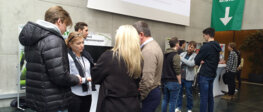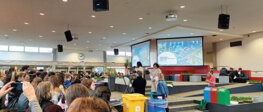In einer Reihe von herausragenden Praxisprojekten haben sich Studierende des Masterstudiengangs Smart Products & Solutions an der FH Kufstein Tirol mit zukunftsweisenden Technologien auseinandergesetzt.

now
FAQ
FAQ
The “kubi” – Kufstein Library for Science and Leisure is a public institution created by the University of Applied Sciences Kufstein Tyrol and by the municipality of Kufstein. It was founded through the merger of the university library and the public library in 2018. The core principles of the "kubi" are: Provision of literature; the passing of knowledge; supporting students, researchers, and teaching staff; and to advance education and reading as a leisure activity. The library is an organization of the FH Kufstein Tirol, University of Applied Sciences.
Anyone interested can use the library services. Members of the FH Kufstein Tirol, University of Applied Sciences (students, researchers and staff) as well as external visitors and members of the International School Kufstein are authorized to borrow books and use the library facilities.
- External visitors:
- The library card can be requested directly at the lending counter of the library during the opening hours.
- Students of the University of Applied Sciences Kufstein:
- Your student card also serves as your library card.
- Students of the International School Kufstein:
- Your edu-card also serves as your library card.
- External visitors with a valid Kufstein-Card
- The use of the library services is included for no additional fee.
- External visitors without a Kufstein-Card:
- There is a charge of € 20.00 for one year (reduced charge of € 10.00 for senior citizens, students and people with disabilities).
- Students of the University of Applied Sciences and students of the International School Kufstein:
- The use of the library services is free of charge.
Reference books, scientific and academic journals, novels, non-fiction books, children’s and young adult literature, board games, audiobooks and DVDs are available to you.
Generally, all books with a white or blue label are borrowable, unless there is an additional red label present. In this case, the item cannot be borrowed. The same applies to newspapers, which can only be read within the library.
You may borrow up to fifteen library items (books, journals, audiobooks, DVDs and board games) for up to three weeks.
Loan periods can be extended three times for up to three weeks each, five days prior to the end of a lending period, unless someone has made a reservation for that item.
Students writing their Bachelor or Master thesis have extended loan privileges.
After logging into our search engine, you can see your name on the top right corner. Next to it is an arrow which leads to the page “My Library Card”. There you can extend your loans.
Books currently on loan can be reserved in your online user account. As soon as the previous borrower returns the item, an automated notice is provided via e-mail.
If you have found a book in our search engine that is currently on loan, click on the Button “Request”. You have to log into your account beforehand.
If you fail to return library items you borrowed on time, we will charge a reminder fee. In the first week the reminder fee is € 1.00 per library item, as of the second week, we will charge you an additional € 5.00 per overdue library item. There is no entitlement to be reminded about an expiring loan.
Our one-stop-shop for searching is our search engine, which allows for browsing all available print and digital media - including journal articles - in the library with a single query. Databases licensed by the library are also searchable (Exception: Statista and Marketline).
External visitors have to choose the search option “Print only” (in the menu bar left). Otherwise all databases and all digital media, which are only available for members of the University of Applied Sciences Kufstein, will be proposed.
A search query can be limited with several criteria, e.g. type of publication, publication year, language, publisher… If a journal article or e-book is found, a link to its full-text-version is provided, if available.
Computers are available within the library facilites to search for items.
E-books can be found within our central search engine. After entering a keyword, the search can be further refined by choosing a filter on the left side of the page. For example, after using the filter "Full Text Online", only electronic resources will show up. Additionally, you can choose the type of medium (e-book, research article, etc.).
E-books can also be found within their respective licensed databases, which more likely than not feature their own filters.
E-journals, much like any other electronic resources, can be found using the kubi search engine. There you can limit the type of medium (i.e. "E-Journal").
To see a list of available databases, electronic journals, and e-books, please click on Databases on the right-hand side of our website. Digital media can be accessed in the University of Applied Sciences' wifi network by all. Outside the premises, access is only granted to members of the University of Applied Sciences Kufstein.
Yes, but only for members of the University of Applied Sciences Kufstein.
The instructions are available on our website: Please click on “Databases” on the right-hand side of our homepage.
In recent years, the rising number of scientific journals and different forms of publication has led to a new challenge for the scientific community, as they are also facing an increase in fraud cases connected to academic publishing. Nowadays it is more important than ever to be aware of alleged publishers whose business model is profit-oriented only. They pretend to publish reliable academic journals especially in digital form. Furthermore, they do not offer appropriate control measures nor the needed quality assurance for standards of good scientific practice – e.g., a peer review process. At the same time authors are charged exorbitant prices. Therefore, it is referred to as Predatory Publishing. Unfortunately, it is often scientists in the making – but not exclusively – who fall victim to such scams because of their lack of experience. Predatory Publishing has a negative impact on the trustworthiness and reachability of affected papers, which not only harms the reputation of the authors involved but also academia in general.
Usually, a distinction is made between Predatory Publishing (i.e. Predatory Publishers), Predatory Journals or Fake Journals, and Predatory Conferences (staged conferences).
Also, be aware of offers from publishers known for publishing seminar works and theses like GRIN, AV Akademikerverlag or Shaker Verlag. They mostly target students who don’t fully understand what consequences might be caused by providing their theses. Once their work is published authors are often excluded from the copyright, making it impossible to republish their original work at a different and reputable publisher.
The following checklist helps to detect possible Predatory Publishers and to determine their credibility:
- The journal is known among colleagues.
- The academic field of the journal is known and clearly stated.
- The publishing house is part of a recognized association (OASPA, DOAJ, COPE, …).
- The communication with the publishing house is straightforward and transparent.
- All the information (editorial board, contact person and details) is stated on the homepage.
- The homepage is free of (technical, grammatical, orthographic) mistakes.
- Peer Review procedures are used in the journal or by the publishing house.
- The costs of the publication and the APC (Article Processing Charges) are known and shared on the website.
- The journal has an ISSN or a DOI.
- It is not listed here: https://www.openacessjournal.com/blog/predatory-journals-list/
If there are any questions regarding Predatory Publishing or if you are unsure of an offer from a publishing house, reach out to our team at the kubi (bibliothek@fh-kufstein.ac.at).
Master theses published from the year 2022 (study year 2020) are available digitally and can be requested via the search engine using the Digitization button.
Publications between 2017-2021 (study year 2015-2019) can be found in the reading room, where they are arranged by degree program. All theses published before 2017 are housed in the stacks and must be pre-ordered for viewing by emailing bibliothek@fh-kufstein.ac.at.
Call number: M - study code + study year / number
Example: M-DIM 16/8
Please note that printed master theses are not available for lending and are to be viewed in the library only.
To find master theses in the search engine, the search term "Hochschulschrift" must be entered. You can also search for keywords or the study code.
Tied to every printed book is a signature (= code on the spine of a book) and its location within the library. Printed books are organized systematically, meaning they are situated according to their signature.
An overview can be found here.
Location Building A 1st floor:
- Fiction, children's and youth literature and biographies
The signatures identify the respective areas. DR stands for fiction, DR.J for the youth area, B the biographies and J indicates a book that is in the children's area.
Within these areas, the books are first sorted by genre and then by author in alphabetical order.
Location Building B 1st floor:
- Reference and non-fiction book area
Books are sorted alphabetically within this area.
Example: Signature: “QQ 000 C229.” The letters denote the discipline, “Q” stands for “Economics”, “QQ” is the sub-category “Special Economics”, the number sequence “000” is a further sub-category, “General”. The following combination of letters and numbers "C229" is an encoding of the name of the author.
Additional information: The edition is shown in the signature with a number in round brackets and the respective volume is indicated with a minus and a number.
- DVDs, audio books and board games
DVDs are labelled with the signature TT and are then alphabetically sorted by genre and title of the movie. Children’s movies are have the signature TT.J.
Similarly, all audio books have the signature TD, are then alphabetically sorted by genre and title with children’s audio books being labelled TD.J.
(Children’s) Board games are sorted by their suggested age group.
Print magazines are divided into two areas. In building A, right next to the shelf for new releases, you will find magazines from the public library. Scientific journals however are located in building B.
Newspapers are located in the newspaper lounge – to the left of the main entrance – and can be read there.
Yes, please do so via the form “purchase request”, which you can find on our homepage or in our search engine. We also have a wish-list for books at the lending counter.
There are three group study rooms for 6, 8 and 10 people, which can be booked via e-mail (bibliothek@fh-kufstein.ac.at).
In principle, the group study rooms are available at short notice – they are unlocked.
Some lecturers choose literature they deem important for their students and put it in a reference collection. They can be found online in our search engine.
An interlibrary loan is a loan from a different library to allow kubi users access to books which are not in possession of the kubi.
If a book is not available within the kubi, it can be lent from a different library through the kubi. This costs € 2,00 per book within the country. Books from outside the country vary in price.
To use interlibrary loaning, the interlibrary loan form in our search engine has to be filled out.
If books are returned too late, the usual fees apply.
The Onleihe Tirol is a digital tool of the Tyrolean libraries and enables various e-books, e-audios and e-papers to be borrowed. These include children's and young people's literature, fiction and non-fiction and can be downloaded either directly in the browser or in the app on the smartphone or tablet as well as on an e-book reader and read for the duration of the loan. It is available free of charge to all readers registered at the kubi.
kubi users with a valid library account can request free online access by e-mail, by phone or from us on site. The online loan account at www.onleihe.com/tirol will then be made available within 48 hours and the loan can begin. The loan period is a maximum of three weeks. The media will then be returned automatically. If a book is not available because it has already been checked out, it can be reserved. The users will be informed by e-mail as soon as the desired book is available again.
Filmfriend, a video-on-demand database for libraries, with an extensive range of products from classic films to sophisticated documentaries, international art house cinema and children's series, can be found at the following web address:
You can log in with the log-in data of the FH Kufstein Tirol (PKZ@stud.fh-kufstein.ac.at and your personal password). Films and series can either be streamed directly or temporarily downloaded for 30 days so that they can also be viewed offline.
Further information on how you can use filmfriend on the various end devices (German only):


